GALLUP NEWS SERVICE
PRINCETON, NJ -- Americans' current perceptions of the effect the 9/11 attacks have had on the United States and on themselves, personally, are similar to what these perceptions were on the first anniversary of the attacks. Even four years after the attacks, an Aug. 28-30 CNN/USA Today/Gallup poll finds most Americans feeling that neither the country nor their own lives have fully returned to normal since terrorists killed nearly 3,000 people on Sept. 11, 2001.
While these evaluations haven't changed since 2002, Americans appear a bit more pessimistic now than they were then about the likelihood that normalcy will ever be fully restored to the country or to their own lives. Nearly two-thirds now say the country will never completely return to normal, while close to half say the same for themselves.
Evaluations of Current Conditions Since 9/11
When asked to evaluate how the country is faring since 9/11, a slim majority of Americans (54%) say the United States is not back to normal, while 42% believe it is "somewhat" back to normal. Thus, 96% of Americans perceive that the country remains changed by the event. Only a scant few (4%) say things are "completely back to normal." These attitudes -- collected before the full scale of the Hurricane Katrina disaster was known -- are virtually identical to previous measures in 2002 and 2003.
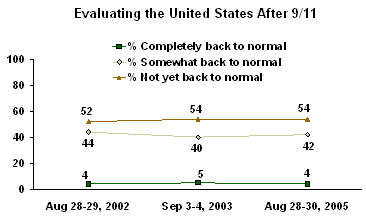
The apparent effect of 9/11 on Americans' personal lives is less severe, but still widespread. A total of 62% of Americans indicate that their lives remain changed by 9/11, including 24% who say their lives are not back to normal, and 38% who say they are only somewhat back to normal.
About one-quarter of Americans say the event did not change their lives, while an additional 14% say it did affect them, but their lives have since completely rebounded.
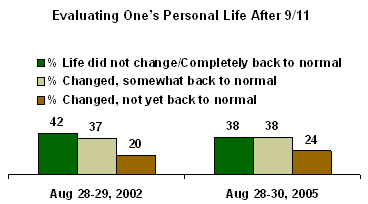
Americans' recovery from 9/11 is quite consistent across demographic groups. Perhaps somewhat remarkably, urban residents are no more likely than those living in the suburbs or rural areas to say that their lives remain changed. There are also no substantial differences on this indicator by region, gender, or age. There are, however, some slight differences by party ID. Seventeen percent of Republicans say their lives are still not back to normal, compared with 30% of Democrats and 25% of independents.
Expectations for Getting Back to "Normal"
When asked to think about the outlook for restoring normalcy in the United States, only a third of Americans (33%) believe the country will eventually return to normal, if it hasn't already. But 63% think it will never return to the way it was before 9/11.
Americans are notably more pessimistic on this measure than they were in 2002 or 2003. At those times, Gallup found more than 4 in 10 Americans expressing optimism that the country would fully recover, and only half the public saying things would never return to normal.
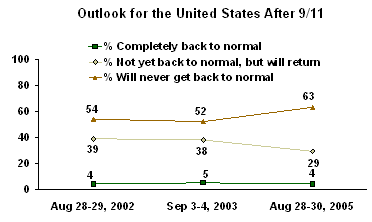
Similarly, Americans are more pessimistic than they were in 2002 about their own lives returning to normal. Today, 42% believe their lives will never completely return to normal, up from 32% in 2002. At the same time, the percentages saying their lives are already mended or predicting they will eventually recover are each down slightly compared with 2002.
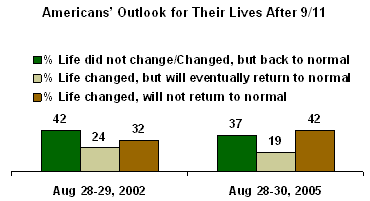
Government Earns Modest Praise
According to the recent poll, Americans generally believe the government's anti-terrorist efforts since the 9/11 attacks have made the country safer from terrorism. But relatively few say the government has made the country a lot safer. Rated separately, the government agencies responsible for preventing terrorist attacks and the U.S. Congress are viewed similarly on this measure.
Only 17% say government anti-terror agencies have made the country a lot safer since Sept. 11, 2001. Another 55% say they have made the country a little safer. Fifteen percent say they have made no difference and 12% say they have made the country less safe.
Similarly, only 17% say Congress has made the country a lot safer through the role it has played in preventing terrorist attacks in the United States. Another 49% say it has made the country a little safer, 21% say it has made no difference, and 12% say it has reduced safety.
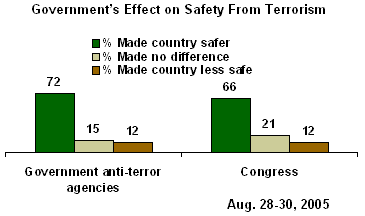
Long-Term Decline in Positive Reviews of War on Terror
Despite these generally positive reviews of the government's anti-terror efforts, public satisfaction with the war on terrorism is down sharply compared with previous measures. Shortly before the first anniversary of 9/11, in September 2002, 75% of Americans were either very or somewhat satisfied with the way things are going for the United States in the war on terrorism. By September 2004, that figure had fallen to 59%, and today it is 51%.
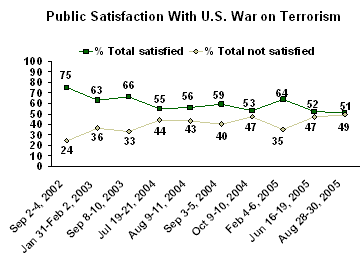
Americans' views of who is winning the war on terrorism have changed a great deal over the past few years. While few Americans have ever said the terrorists are winning, the perception of whether the United States and its allies are winning or neither side is winning goes back and forth. Today -- as has been the case for the past year -- the slight plurality of Americans say neither side is winning.
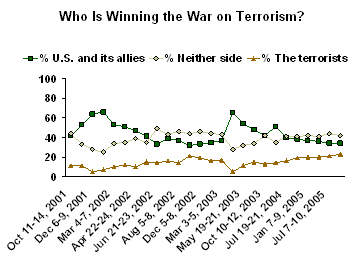
Survey Methods
These results are based on telephone interviews with a randomly selected national sample of 1,007 adults, aged 18 and older, conducted Aug. 28-30, 2005. For results based on this sample, one can say with 95% confidence that the maximum error attributable to sampling and other random effects is ±3 percentage points. In addition to sampling error, question wording and practical difficulties in conducting surveys can introduce error or bias into the findings of public opinion polls.
12. Who do you think is currently winning the war against terrorism -- [ROTATED: the U.S. and its allies, neither side, or the terrorists]?
BASED ON 507 NATIONAL ADULTS IN FORM A
|
U.S. and |
Neither |
The |
No |
|
|
% |
% |
% |
% |
|
|
2005 Aug 28-30 ^ |
34 |
42 |
23 |
1 |
|
|
|
|
|
|
|
2005 Jul 7-10 |
34 |
44 |
21 |
1 |
|
2005 Jun 24-26 |
36 |
41 |
20 |
3 |
|
2005 Jan 7-9 |
37 |
42 |
20 |
1 |
|
2004 Oct 9-10 ^ |
38 |
41 |
19 |
2 |
|
2004 Jul 19-21 ^ |
40 |
41 |
16 |
3 |
|
2004 Jan 12-15 ^ |
51 |
35 |
14 |
* |
|
2003 Oct 10-12 |
42 |
42 |
13 |
3 |
|
2003 Jul 18-20 |
48 |
34 |
15 |
3 |
|
2003 May 19-21 |
54 |
32 |
11 |
3 |
|
2003 Apr 22-23 |
65 |
28 |
5 |
2 |
|
2003 Mar 3-5 ^ |
37 |
43 |
17 |
3 |
|
2003 Jan 31-Feb 2 ^ |
35 |
44 |
16 |
5 |
|
2002 Dec 5-8 ^ |
33 |
46 |
19 |
2 |
|
2002 Oct 14-17 ^ |
32 |
44 |
21 |
3 |
|
2002 Aug 5-8 ^ |
37 |
46 |
14 |
3 |
|
2002 Jul 5-8 |
39 |
43 |
16 |
2 |
|
2002 Jun 21-23 |
33 |
49 |
14 |
4 |
|
2002 May 28-29 |
41 |
35 |
15 |
9 |
|
2002 Apr 22-24 |
47 |
39 |
10 |
4 |
|
2002 Mar 22-24 |
51 |
35 |
12 |
2 |
|
2002 Mar 4-7 |
53 |
34 |
10 |
3 |
|
2002 Jan 7-9 ^ |
66 |
25 |
7 |
2 |
|
2001 Dec 6-9 |
64 |
28 |
5 |
3 |
|
2001 Nov 8-11 ^ |
53 |
33 |
11 |
3 |
|
2001 Oct 11-14 |
42 |
44 |
11 |
3 |
|
|
|
|
|
|
|
^Asked of a half sample |
||||
13. How satisfied are you with the way things are going for the U.S. in the war on terrorism -- very satisfied, somewhat satisfied, not too satisfied, or not at all satisfied?
BASED ON 500 NATIONAL ADULTS IN FORM B
|
|
Very |
Somewhat |
Not too |
Not at all |
No |
|
% |
% |
% |
% |
% |
|
|
2005 Aug 28-30 ^ |
13 |
38 |
20 |
29 |
* |
|
|
|
|
|
|
|
|
2005 Jun 16-19 |
10 |
42 |
23 |
24 |
1 |
|
2005 Feb 4-6 |
19 |
45 |
21 |
14 |
1 |
|
2004 Oct 9-10 ^ |
16 |
37 |
21 |
26 |
* |
|
2004 Sep 3-5 ^ |
16 |
43 |
22 |
18 |
1 |
|
2004 Aug 9-11 ^ |
14 |
42 |
24 |
19 |
1 |
|
2004 Jul 19-21 ^ |
15 |
40 |
21 |
23 |
1 |
|
2003 Sep 8-10 |
14 |
52 |
21 |
12 |
1 |
|
2003 Jan 31-Feb 2 ^ |
18 |
45 |
21 |
15 |
1 |
|
2002 Sep 2-4 |
14 |
61 |
18 |
6 |
1 |
|
|
|||||
|
^Asked of a half sample |
|||||
14. Thinking back to the Sept. 11, 2001, attacks on the World Trade Center and the Pentagon, did you feel at the time that your life had changed in any way or didn't you feel that way?
|
Life had |
Didn't feel |
No |
|
|
|
|
|
|
|
2005 Aug 28-30 |
76% |
24 |
* |
|
|
|
|
|
|
2002 Aug 28-29 ^ |
68% |
31 |
1 |
|
^CNN/TIME poll |
|||
15. In general, do you feel your life is completely back to normal, somewhat back to normal but not completely, or not yet back to normal?
COMBINED RESPONSES (Q.14-15)
|
|
Changed, completely back to normal |
Changed, somewhat back to normal |
|
|
|
|
|
|
|
|
|
|
|
2005 Aug 28-30 |
14% |
38 |
24 |
24 |
* |
|
|
|
|
|
|
|
|
2002 Aug 28-29 ^ |
11% |
37 |
20 |
31 |
1 |
|
|
|||||
|
^CNN/TIME poll |
|||||
16. Do you think your life will ever completely return to normal at some point in the future, or don't you feel that way?
COMBINED RESPONSES (Q.14-16)
|
|
Life didn't change/life changed, but back to normal |
|
|
|
|
|
|
|
|
|
|
2005 Aug 28-30 |
37% |
19 |
42 |
2 |
|
|
|
|
|
|
|
2002 Aug 28-29 ^ |
42% |
24 |
32 |
2 |
|
|
||||
|
^CNN/TIME poll |
||||
17. Generally speaking, do you think things in the country are completely back to normal, somewhat back to normal but not completely, or not yet back to normal?
|
|
Completely |
Somewhat |
Not yet |
No |
|
|
|
|
|
|
|
2005 Aug 28-30 |
4% |
42 |
54 |
* |
|
|
|
|
|
|
|
2003 Sep 3-4 ^ |
5% |
40 |
54 |
1 |
|
2002 Aug 28-29 ^ |
4% |
44 |
52 |
-- |
|
|
||||
|
^CNN/TIME poll |
||||
18. Do you think the country will ever completely return to normal at some point in the future, or don't you think so?
COMBINED RESPONSES (Q.17-18)
|
|
|
Not back to normal, will return to normal |
|
|
|
|
|
|
|
|
|
2005 Aug 28-30 |
4% |
29 |
63 |
4 |
|
|
|
|
|
|
|
2004 Sep 3-4 ^ |
5% |
38 |
52 |
5 |
|
2002 Aug 28-29 ^ |
4% |
39 |
54 |
3 |
|
|
||||
|
^CNN/TIME poll |
||||
19. Thinking now about the government agencies responsible for preventing terrorist attacks in the United States, do you think the actions of these agencies since Sept. 11, 2001, have made the country -- [ROTATED: a lot safer, a little safer, have they made no difference, have they made it a little less safe, (or) a lot less safe]?
BASED ON 507 NATIONAL ADULTS IN FORM A
|
|
A lot |
A little |
No |
A little |
A lot |
No |
|
|
|
|
|
|
|
|
|
2005 Aug 28-30 |
17% |
55 |
15 |
7 |
5 |
1 |
19A. Thinking now about Congress and the role it has played in preventing terrorist attacks in the United States, do you think the actions of Congress since Sept. 11, 2001, have made the country -- [ROTATED: a lot safer, a little safer, have they made no difference, have they made it a little less safe, (or) a lot less safe]?
BASED ON 500 NATIONAL ADULTS IN FORM A
|
|
A lot |
A little |
No |
A little |
A lot |
No |
|
|
|
|
|
|
|
|
|
2005 Aug 28-30 |
17% |
49 |
21 |
6 |
6 |
1 |
